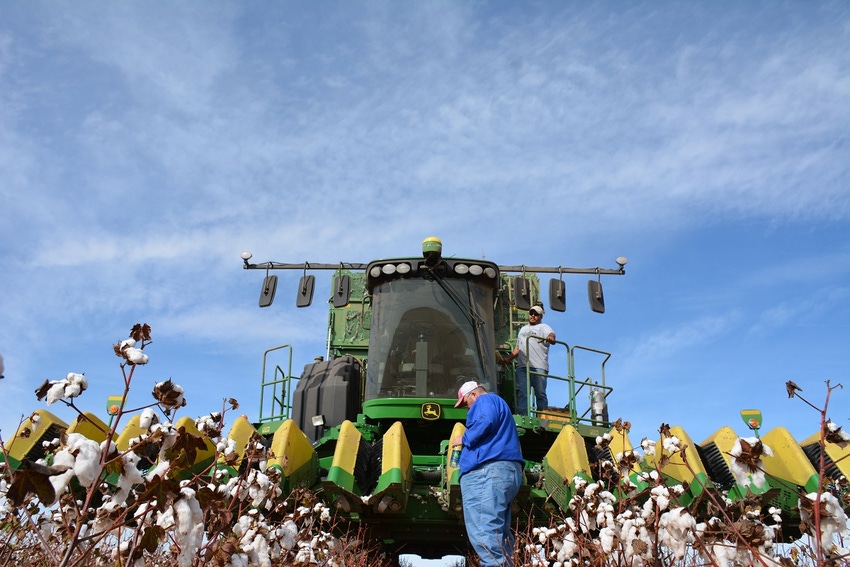
Last fall, High Plains cotton farmers harvested the largest crop they’ve made since 2010 — but a combination of high production costs, low prices, and some production issues left many struggling to just break even.
That’s the picture Plains Cotton Growers, Inc. President Shawn Holladay painted during his address at the organization’s annual meeting at Lubbock.
PCG, representing 41 High Plains counties and some 3.5 million acres of cotton, has worked diligently the past year to find support for “the financial health of farm country,” he says. “We have made tremendous progress in Washington with regard to helping congressional and agency leaders to be more aware of the dire situation in cotton country.”
For the latest on southwest agriculture, please check out Southwest Farm Press Daily and receive the latest news right to your inbox.
PCG worked with other cotton organizations “to defeat several amendments that would have been detrimental to the cotton industry and to crop insurance,” Holladay says. “In October, devastating crop insurance cuts were proposed as part of a budget agreement between the White House and Congress. PCG and other organizations went to work on a grassroots effort to repeal those proposed cuts.
“We sent action alerts, made phone calls, sent e-mails, and encouraged others to do the same, and were successful in that endeavor — the cuts were repealed in early December. In fact, we were told that members of Congress said they had never seen a grassroots effort quite like it.”
PCG also took a leading role in encouraging Secretary of Agriculture Tom Vilsack to designate cottonseed as an “other oilseed,” to make it eligible for farm bill support through either the Price Loss Coverage or the Agricultural Risk Coverage option.
COTTON COUNTRY HURTING
“I would like to publicly thank Chairman Mike Conaway (R-Texas), the House Agriculture Committee, and our friends in Congress for helping us to make crystal clear to the USDA that cotton country was hurting, and needed a long-term solution. Although Secretary Vilsack said officially in February that he did not have the legal authority to designate cottonseed as an other oilseed, that hasn’t stopped us. We continue to work on behalf of our producers.”
A recent trip to Washington included a meeting with Vilsack to discuss the possibility of a ginning cost-share program. “While nothing is definite yet,” Holladay says, “we remain hopeful that we will soon have at least a short-term solution to help us meet our challenges as we go into the 2016 crop.”
Cotton growers and others involved in the industry must “stay engaged” in supporting and defending cotton, he says “Opponents, such as the Environmental Working Group, will continue to attack crop insurance and other aspects of farm policy, and we must remain vigilant — and most importantly, unified.”
Working with the National Cotton Council, Cotton Incorporated, the Cotton Board, Cotton Council International, and similar industry groups helps to “enact favorable policies, encourage people to buy cotton, insure that we’re on the cutting edge of research, and promote cotton around the world,” he says.
“We must continue to work with Cotton Council International to encourage overseas manufacturers to prefer U.S. cotton. International markets want quality cotton right now, and no one is in a better position than the U.S. to provide that.”
GET INVOLVED
Every cotton producer needs to get involved, Holladay says. “I have asked this question before, but it is still just as relevant today: Are you doing enough to insure that we have the leverage we need?”
He urges growers and others in the industry to support the Committee for the Advancement of Cotton (the National Cotton Council’s Political Action Committee) and the newly-formed Plains Cotton Growers, Inc., PAC. “These help us to be better equipped to have an even stronger interface with Capitol Hill and, subsequently, the opportunity to be an even stronger voice for cotton producers as we move forward.
“We’ve all been forced to cut our costs,” he says, “but this is an investment in our future as an industry. None of these opportunities would be possible without growers willing to step up and contribute.”
Holladay concluded his remarks — his last official act as PCG president — by praising the organization’s staff and encouraging PCG members to continue to work for cotton.
“It’s a privilege to have served as a leader of this organization, and I haven’t taken the responsibility lightly,” he said. “We have tackled many difficult issues lately, and there will be more on down the road. But we will never, ever stop searching for solutions.”
About the Author(s)
You May Also Like






